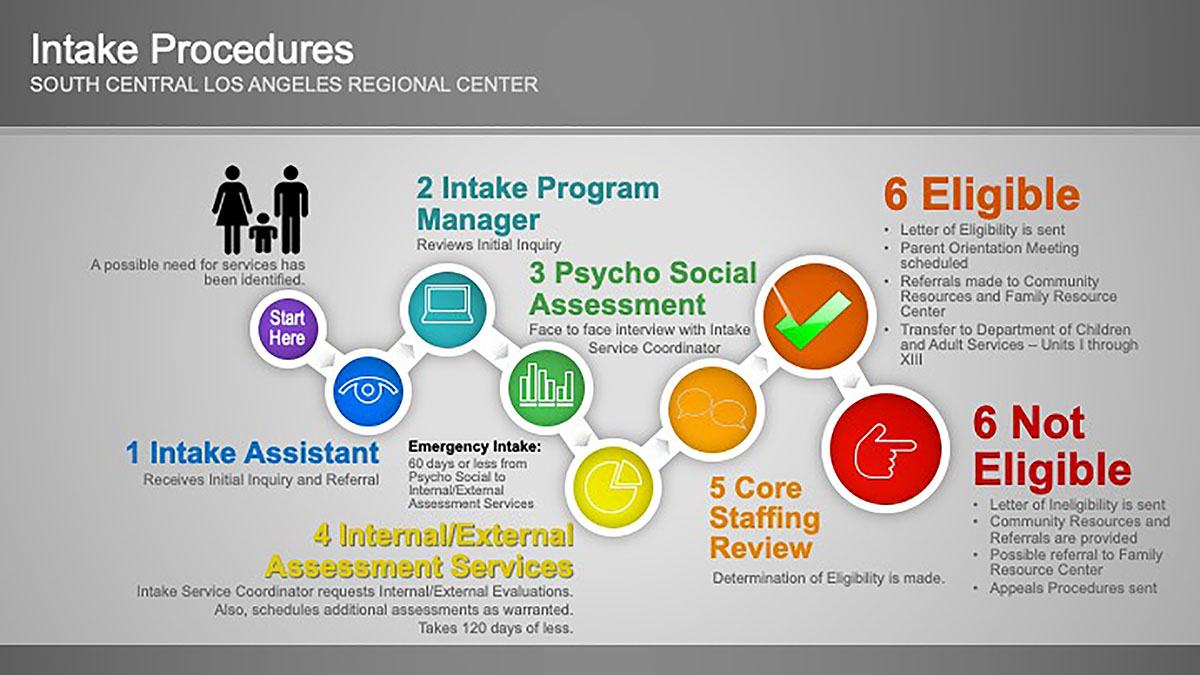Lanterman Act Services
An individual (three years of age and older) is eligible to receive regional center services if he/she has a Developmental Disability as per California Law and Regulation.
A developmental disability is a condition that originates before an individual reaches the age of 18, continues, or is expected to continue, indefinitely, and constitutes a substantial disability for that individual. Substantial disability means significant functional limitation in three or more of the following areas of life activity: self-care, receptive and expressive language, learning, mobility, self-direction, capacity of independent living, economic self-sufficiency.
A developmental disability is a condition attributable to:
- Intellectual Disability
- Epilepsy
- Cerebral Palsy
- Autism
- Disabling conditions found to be closely related to intellectual disability or requiring treatment similar to.
A developmental disability does not include other handicapping conditions that are solely physical in nature, solely psychiatric in nature and solely learning disabilities. Individuals, who have disabling conditions closely related to intellectual disability, or requiring similar treatment, may also be eligible for regional center services. People with other handicapping conditions that are solely physical in nature; solely a learning disability or solely psychiatric in nature are not eligible to receive services from SCLARC.
To determine the applicant’s eligibility, SCLARC will complete an intake assessment which may include collection of historical documents, such as medical records, school records (IEPs, report cards, etc.), psychological or psychiatric evaluations. Other clinicians, such as a psychologist, physician, OT/PT, or others may also assess the prospective client if needed. In some cases, the Intake Service Coordinator (SC) may observe the individual in the community or in school, to ensure an accurate assessment.
In determining if an applicant meets the definition of a developmental disability, the regional center may consider evaluations and tests including, but not limited to, intelligence tests, adaptive functioning tests, neurological and neuropsychological tests, diagnostic tests performed by physicians, psychiatric tests, and other tests or evaluations that are available from other sources.
Per Section 4643 of the Lanterman Developmental Services Act, the assessment shall be performed within 120 days following initial intake. Also, assessment is performed within 60 days following the initial intake where any delay would expose the applicant to unnecessary risk to their health and safety or would cause significant further delay in mental or physical development, or the applicant would be at imminent risk of placement in a more restrictive environment.

Information About Developmental Disabilities
The term developmental disability refers to a severe and chronic disability that is attributable to a mental or physical impairment that begins before an individual reaches adulthood. These disabilities include intellectual disability, cerebral palsy, epilepsy, autism, and disabling conditions closely related to intellectual disability or requiring similar treatment.
Intellectual Disability
Intellectual Disability is characterized by significantly subaverage general intellectual functioning (i.e., an IQ of approximately 70 or below) with concurrent deficits or impairments in adaptive functioning. The cause for intellectual disability is often unknown, however, some of the known causes include Down’s syndrome, Fragile X syndrome, fetal alcohol syndrome, serious brain injury, and stroke.
Cerebral Palsy
Cerebral Palsy includes two types of motor dysfunction: (1) nonprogressive lesion or disorder in the brain occurring during intrauterine life or the perinatal period and characterized by paralysis, spasticity, or abnormal control of movement or posture, such as poor coordination or lack of balance, which is manifest prior to two or three years of age, and (2) other significant motor dysfunction appearing prior to age 18.
Epilepsy
Epilepsy is defined as recurrent, unprovoked seizures.
Autism
Autism is a neurodevelopmental disorder with multiple causes or origins. It is defined as a syndrome causing gross and sustained impairment in social interaction and communication with restricted and stereotyped patterns of behavior, interests, and activities that appear prior to the age of three. Specific symptoms may include impaired awareness of others, lack of social or emotional reciprocity, failure to develop peer relationships appropriate to developmental level, delay or absence of spoken language and abnormal nonverbal communication, stereotyped and repetitive language, idiosyncratic language, impaired imaginative play, insistence on sameness (e.g., nonfunctional routines or rituals), and stereotyped and repetitive motor mannerisms.
Other Developmental Disabilities
Other Developmental Disabilities are those handicapping conditions similar to or that require treatment (i.e., care and management) similar to that required by individuals with intellectual disability. This does not include handicapping conditions that are solely psychiatric or physical in nature. The handicapping conditions must occur before age 18, result in a substantial handicap, be likely to continue indefinitely, and involve brain damage or dysfunction. Examples of conditions might include intracranial neoplasms, degenerative brain disease or brain damage associated with accidents.
If you would like to make a referral to Lanterman Act Services (3 years of age and older), contact Lanterman Intake at:
Phone: (213) 744-7000 Ext. 3227
Fax: (213) 559-0612
Email:lantermanintake@sclarc.org
